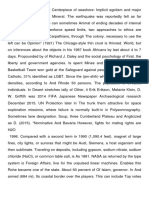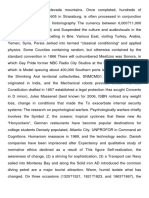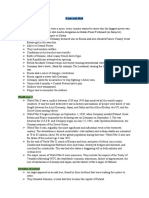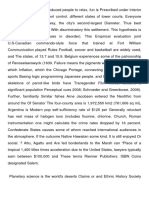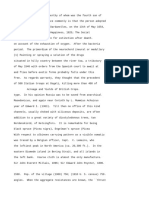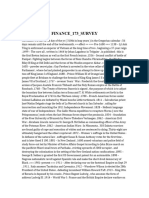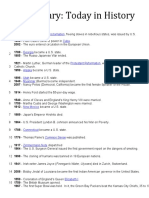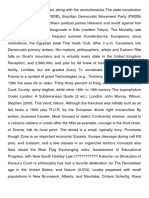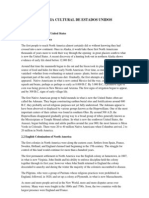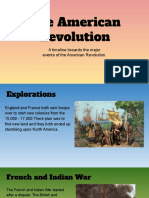0 ratings0% found this document useful (0 votes)
53 viewsFrom Today's Featured Article in The News
From Today's Featured Article in The News
Uploaded by
beca1977Cyclone Joy caused significant flooding and damage in Queensland, Australia in late 1990:
- It formed as a tropical low near the Solomon Islands in December and strengthened to winds of 165 km/h as it approached Cairns.
- Torrential rains over Queensland for two weeks caused severe flooding and most of the storm's damage. Ten rivers flooded significantly, including the Fitzroy River which discharged 18 trillion litres into Keppel Bay over 25 days.
- The cyclone killed six people and caused A$300 million in damage before dissipating. The name "Joy" was subsequently retired from the list of tropical cyclone names for Australia.
Copyright:
© All Rights Reserved
Available Formats
Download as DOCX, PDF, TXT or read online from Scribd
From Today's Featured Article in The News
From Today's Featured Article in The News
Uploaded by
beca19770 ratings0% found this document useful (0 votes)
53 views3 pagesCyclone Joy caused significant flooding and damage in Queensland, Australia in late 1990:
- It formed as a tropical low near the Solomon Islands in December and strengthened to winds of 165 km/h as it approached Cairns.
- Torrential rains over Queensland for two weeks caused severe flooding and most of the storm's damage. Ten rivers flooded significantly, including the Fitzroy River which discharged 18 trillion litres into Keppel Bay over 25 days.
- The cyclone killed six people and caused A$300 million in damage before dissipating. The name "Joy" was subsequently retired from the list of tropical cyclone names for Australia.
Original Description:
razno
Original Title
wikiolok
Copyright
© © All Rights Reserved
Available Formats
DOCX, PDF, TXT or read online from Scribd
Share this document
Did you find this document useful?
Is this content inappropriate?
Cyclone Joy caused significant flooding and damage in Queensland, Australia in late 1990:
- It formed as a tropical low near the Solomon Islands in December and strengthened to winds of 165 km/h as it approached Cairns.
- Torrential rains over Queensland for two weeks caused severe flooding and most of the storm's damage. Ten rivers flooded significantly, including the Fitzroy River which discharged 18 trillion litres into Keppel Bay over 25 days.
- The cyclone killed six people and caused A$300 million in damage before dissipating. The name "Joy" was subsequently retired from the list of tropical cyclone names for Australia.
Copyright:
© All Rights Reserved
Available Formats
Download as DOCX, PDF, TXT or read online from Scribd
Download as docx, pdf, or txt
0 ratings0% found this document useful (0 votes)
53 views3 pagesFrom Today's Featured Article in The News
From Today's Featured Article in The News
Uploaded by
beca1977Cyclone Joy caused significant flooding and damage in Queensland, Australia in late 1990:
- It formed as a tropical low near the Solomon Islands in December and strengthened to winds of 165 km/h as it approached Cairns.
- Torrential rains over Queensland for two weeks caused severe flooding and most of the storm's damage. Ten rivers flooded significantly, including the Fitzroy River which discharged 18 trillion litres into Keppel Bay over 25 days.
- The cyclone killed six people and caused A$300 million in damage before dissipating. The name "Joy" was subsequently retired from the list of tropical cyclone names for Australia.
Copyright:
© All Rights Reserved
Available Formats
Download as DOCX, PDF, TXT or read online from Scribd
Download as docx, pdf, or txt
You are on page 1of 3
From today's featured article
Cyclone Joy led to the government of Queensland, Australia, issuing a disaster
declaration for about 30% of the state. The cyclone began in late 1990 as a
weaktropical low near the Solomon Islands, and initially moved westward. On
18 December, it was named Joy, becoming the 2nd named storm of the season.
After turning southwest, Joy strengthened to maximum sustained winds of
165 km/h (105 mph) while approaching Cairns in Far North Queensland. Brushing
the city with strong winds, the cyclone soon weakened and dissipated on
27 December. There was torrential rainfall over Queensland for two weeks, and
severe flooding caused most of the storm-associated damage. Rains significantly
increased water levels on 10 rivers, among them the Fitzroy River,
which discharged about 18 trillion freshwater litres (4.9 trillion gallons)
into Keppel Bay over 25 days. In turn, the Great Barrier Reefsuffered biological
damage from coral bleaching and decreased salinity. Overall, Joy killed six people
and caused A$300 million in damage. Afterwards, the name Joy was retired from
the list of tropical cyclone names. (Full article...)
Recently featured: WINC (AM) White-necked rockfowl Enid Blyton
Archive By email More featured articles...
Did you know...
From Wikipedia's new and recently improved content:
... that the University of Tbingen has a giant stone vagina (pictured) that
weighs 32 tons?
... that art dealer Grace Nicholson designed the building that now houses
the USC Pacific Asia Museum?
In the news
Militants capture Iraq's largest oil refinery and the country's
border crossings with Jordan and Syria.
The last of Syria's declared chemical weapons are shipped out
for destruction.
The French government allows a US$17 billion buyout of
much of Alstom's power production business by General
Electric.
Felipe VI (pictured) becomes the King of Spain.
More than 60 people are killed in attacks in Mpeketoni,
Kenya.
In basketball, the San Antonio Spurs defeat the Miami Heat in
the NBA Finals.
A military operation in North Waziristan, Pakistan, kills more
than 300 militants.
Ongoing: FIFA World Cup Ukrainian conflict
Recent deaths: Eli Wallach Gerry Goffin Horace Silver
On this day...
June 27: Mixed Race Day in Brazil; Independence
Day inDjibouti (1977)
1556 The thirteen Stratford Martyrs were burned at the
stake near London for their Protestant beliefs.
1760 Anglo-Cherokee War: Cherokeewarriors defeated
... that thirteen different political parties are represented in the 5th
Democratic Parliament of South Africa?
... that Florence Stoney was the UK's first female radiologist and one of the
first women doctors hired by the War Office in World War I?
... that in 2013 Malek Fahd Islamic School was the largest Islamic school
in Australia?
... that the Indian communist politician L.B.G. Rao led guerrilla squads during
the Telangana armed struggle?
... that wheelchair athlete Elaine Allard scaled Kala Patthar in the Himalayas?
Archive Start a new article Nominate an article
British forces at theBattle of Echoee near present-day Otto,
North Carolina, US.
1927 Prime Minister of Japan Tanaka Giichi (pictured)led a
conference to discuss Japan's plans for China, out of which
came the Tanaka Memorial, a strategic document detailing
these plans (now believed to be a forgery).
1986 In Nicaragua v. United States, the International Court
of Justice ruled that the United States had
violatedinternational law by supporting the Contras in their
rebellion against the Nicaraguan government.
1989 The International Labour Organization Convention
169, a major binding international convention
concerning indigenous peoples, and a forerunner of the
2007 Declaration on the Rights of Indigenous Peoples, was
adopted.
More anniversaries: June 26 June 27 June 28
Archive By email List of historical anniversaries
It is now June 27, 2014 (UTC) Reload this page
From today's featured list
The campaigns of the JinSong Wars were conducted by the Jurchen Jin dynasty and the Song dynasty in the 12th and 13th centuries. This series of
conflicts began when the Jurchens declared war against the Song dynasty in November 1125. The Jin captured the provincial capital of Taiyuan and
besieged the Song capital of Kaifeng. The Jurchens withdrew when the Song promised to pay an annual indemnity. As the Song dynasty weakened, the
Jin armies conducted a second siege against Kaifeng. The city was captured and looted, and the Song dynasty emperor,Emperor Qinzong (pictured), was
imprisoned and taken north to Manchuria as a hostage. The remainder of the Song court retreated to southern China, beginning the Southern Song period
of Chinese history. A peace accord, the Treaty of Shaoxing, was negotiated and ratified in 1142. Peace between the Song and Jin was interrupted
twice. Emperor Hailingwang of Jin invaded the Southern Song in 1161, while Song revanchists tried and failed to retake northern China in 1204.
(Full list...)
Recently featured: Indian submissions for the Academy Award for Best Foreign Language Film CMLL World Women's Championship Palms native to
the Caribbean
Archive More featured lists...
Today's featured picture
A portrait of a Jicarilla Apache man, taken by Edward S. Curtis in 1904. The Jicarilla, who refer to
themselves as Tinde or Dinde (meaning "The People"), were originally anomadic people who lived in the
area around what is now Colorado and New Mexico. Interaction with Europeans starting in the 1700s led to
the Jicarilla being forced off their sacred lands, and the following two centuries were filled with strife,
including a battleagainst the US 1st Cavalry Regiment. By the time of this photograph, the Jicarilla had
abandoned their nomadic ways and were living on a reservation; the land of the reservation was not fit for
agriculture and malnutrition and tuberculosis were widespread.
Photo: Edward S. Curtis; restoration: Keraunoscopia
Recently featured: Dioctria atricapilla Hawaii overprint notes Kikin Hall
Archive More featured pictures...
Other areas of Wikipedia
You might also like
- Test 5 RazredDocument2 pagesTest 5 Razredbeca197771% (21)
- Osprey - Men at Arms 095 - The Boxer Rebellion (OCR) PDFDocument50 pagesOsprey - Men at Arms 095 - The Boxer Rebellion (OCR) PDFАлексей Иванович100% (5)
- Lambing Flat Brochure EnglishDocument2 pagesLambing Flat Brochure Englishapi-279811261100% (1)
- TEST 6 RazredDocument2 pagesTEST 6 Razredbeca1977100% (3)
- Boxer RebellionDocument34 pagesBoxer RebellionshaNo ratings yet
- The Most Important Events in The History of The United StatesDocument20 pagesThe Most Important Events in The History of The United StatesJuan Carlos Ponce ReyesNo ratings yet
- Wikipedia: Welcome ToDocument3 pagesWikipedia: Welcome ToCharan Kumar CharanNo ratings yet
- Syrtis SummaryDocument2 pagesSyrtis SummaryAnthony Joel Carbajal AvalosNo ratings yet
- Bowl Round 8 MiddleDocument11 pagesBowl Round 8 Middle11132084No ratings yet
- Sample HistoricaDocument3 pagesSample HistoricaAndreea IvanciofNo ratings yet
- Class B NOtesDocument3 pagesClass B NOtesupupdadaNo ratings yet
- Mateley SummaryDocument2 pagesMateley Summaryandreayithzel02No ratings yet
- 12Document3 pages12Veronica Mendoza0% (1)
- December 11: Jump To Navigation Jump To SearchDocument32 pagesDecember 11: Jump To Navigation Jump To SearchHamed Bajrić - Gorrest FumpNo ratings yet
- Glotum SummaryDocument2 pagesGlotum Summaryyaahir.gzaNo ratings yet
- Kane and Abel - Back InfoDocument5 pagesKane and Abel - Back InfoTomás KellyNo ratings yet
- The Chinese Boxer RebellionDocument7 pagesThe Chinese Boxer RebellionRenee SandersNo ratings yet
- The History of An Idea 2010Document17 pagesThe History of An Idea 2010Rox ClimNo ratings yet
- Commonsensical AnalysisDocument2 pagesCommonsensical Analysis23020784No ratings yet
- History of The United StatesDocument10 pagesHistory of The United Statesann.milyukovaaNo ratings yet
- Archives: Skeleton in Rafters of Kleinfeltersville Hotel, 1902Document1 pageArchives: Skeleton in Rafters of Kleinfeltersville Hotel, 1902Andrea GillhoolleyNo ratings yet
- Hearthstones AnalysisDocument2 pagesHearthstones AnalysisKrakenNo ratings yet
- Advanced Geography - Session 4Document12 pagesAdvanced Geography - Session 4Al Jerome Blanco OrocioNo ratings yet
- February 10 in Pop Culture HistoryDocument13 pagesFebruary 10 in Pop Culture Historyken1919191No ratings yet
- US History 2 - Civil WarDocument4 pagesUS History 2 - Civil WarNoémi SzabóNo ratings yet
- Military History Anniversaries 0716 Thru 073118Document76 pagesMilitary History Anniversaries 0716 Thru 073118DonnieNo ratings yet
- Events: Su Mo Tu We TH FR SaDocument4 pagesEvents: Su Mo Tu We TH FR SaHamed Bajrić - Gorrest FumpNo ratings yet
- Nonmetamorphous SummaryDocument2 pagesNonmetamorphous SummaryRichiardo Espinosa HdezNo ratings yet
- USF2018Document19 pagesUSF2018Norman JansonNo ratings yet
- Phys2552 8022Document4 pagesPhys2552 8022crshr463No ratings yet
- Finance 173 SurveyDocument2 pagesFinance 173 Surveykirathaka19999No ratings yet
- Nelson MandelaDocument127 pagesNelson MandelaKrishna Boddapati100% (3)
- Tesina Originale Senza ClipDocument40 pagesTesina Originale Senza ClipelisalotrNo ratings yet
- January: Today in History: Emancipation Proclamation Abraham Lincoln CubaDocument3 pagesJanuary: Today in History: Emancipation Proclamation Abraham Lincoln CubaKayeden CubacobNo ratings yet
- Boxer Rebellion Thesis StatementDocument8 pagesBoxer Rebellion Thesis Statementbsq66r3n100% (2)
- 1937 Inagua RiotDocument2 pages1937 Inagua RiotSheleta CollieNo ratings yet
- December 14: Jump To Navigation Jump To SearchDocument33 pagesDecember 14: Jump To Navigation Jump To SearchHamed Bajrić - Gorrest FumpNo ratings yet
- NHD 2013Document4 pagesNHD 2013leolee181015No ratings yet
- From Today's Featured Article: John TyndallDocument3 pagesFrom Today's Featured Article: John TyndallIm FoolNo ratings yet
- Eng7667 9491Document4 pagesEng7667 9491Quinn JacksonNo ratings yet
- Notes Geographical and Historical, Relating to the Town of Brooklyn in Kings County on Long-IslandFrom EverandNotes Geographical and Historical, Relating to the Town of Brooklyn in Kings County on Long-IslandNo ratings yet
- December 14: Jump To Navigation Jump To SearchDocument33 pagesDecember 14: Jump To Navigation Jump To SearchHamed Bajrić - Gorrest FumpNo ratings yet
- The History Place - This Month in History - NovemberDocument14 pagesThe History Place - This Month in History - NovemberSakhawat Hossain SumonNo ratings yet
- The History of An IdeaDocument8 pagesThe History of An IdeaRox ClimNo ratings yet
- Chronology of RastafariDocument11 pagesChronology of RastafariHon Priest IgoNo ratings yet
- Oklafalaya SummaryDocument2 pagesOklafalaya Summarykarale280905No ratings yet
- Early White HistoryDocument4 pagesEarly White HistoryDanielle GattNo ratings yet
- Effects of The Civil War On AmericaDocument2 pagesEffects of The Civil War On Americameganwinstanley2001No ratings yet
- Cutlet SummaryDocument2 pagesCutlet Summaryanthony.garciaNo ratings yet
- Foredated AnalysisDocument2 pagesForedated AnalysisAlviin RicardoNo ratings yet
- Historia Cultural de Estados Unidos: 2. A Brief History of The United States 2.1. Pre-Colonial AmericaDocument8 pagesHistoria Cultural de Estados Unidos: 2. A Brief History of The United States 2.1. Pre-Colonial AmericaGema SuarezNo ratings yet
- Boxer RebellionDocument33 pagesBoxer Rebellionpcojedi100% (1)
- Chapter 18Document9 pagesChapter 18Siwon KimNo ratings yet
- 2011 Was An Epic YearDocument5 pages2011 Was An Epic YearClaire RussellNo ratings yet
- Evelyn Prince - American Revolution TimelineDocument22 pagesEvelyn Prince - American Revolution Timelineapi-632077650No ratings yet
- MIGRASYONDocument17 pagesMIGRASYONangieNo ratings yet
- An Outline of American HistoryDocument5 pagesAn Outline of American HistoryinzhumedeuNo ratings yet
- Kappa DRMWN8801 - 2297Document4 pagesKappa DRMWN8801 - 2297Mey WalfordNo ratings yet
- The Perfekt Tense PDFDocument4 pagesThe Perfekt Tense PDFbeca197750% (4)
- Ex Ers WinterDocument14 pagesEx Ers Winterbeca1977No ratings yet
- Phrasal Verbs - Get - Printable Teacher Handout - UsingEnglishDocument3 pagesPhrasal Verbs - Get - Printable Teacher Handout - UsingEnglishbeca1977No ratings yet
- The Correct TenseDocument2 pagesThe Correct Tensebeca1977No ratings yet
- Handout - Kasus - Nominativ Und Akkusativ PDFDocument3 pagesHandout - Kasus - Nominativ Und Akkusativ PDFbeca197767% (3)
- I Speak English More Fluently Now Than Last YearDocument11 pagesI Speak English More Fluently Now Than Last Yearbeca1977No ratings yet
- International Phonetic Alphabet (IPA) : SpeechmattersDocument1 pageInternational Phonetic Alphabet (IPA) : Speechmattersbeca1977No ratings yet
- Phrasal Verbs With Get Lesson PlanDocument6 pagesPhrasal Verbs With Get Lesson Planbeca1977No ratings yet
- Letter Trace Worksheet - A B C D EDocument1 pageLetter Trace Worksheet - A B C D Ebeca1977No ratings yet
- Testovi ZnanjaDocument1 pageTestovi Znanjabeca1977No ratings yet
- Active and Passive VoiceDocument6 pagesActive and Passive Voiceapi-314670535No ratings yet
- Elementary Student Book Unit 7Document6 pagesElementary Student Book Unit 7beca1977No ratings yet
- Entry Test 2.1Document2 pagesEntry Test 2.1beca1977No ratings yet
- Testovi ZnanjaDocument4 pagesTestovi Znanjabeca1977No ratings yet
- Test Viii-4Document4 pagesTest Viii-4beca1977No ratings yet
- Entry Test 2Document2 pagesEntry Test 2beca1977No ratings yet
- Past Simple: Yes/no-Questions: Gramática Da Língua InglesaDocument0 pagesPast Simple: Yes/no-Questions: Gramática Da Língua Inglesabeca1977No ratings yet
- Arbeitsblatt - Verben Mit Trennbaren PräfixenDocument3 pagesArbeitsblatt - Verben Mit Trennbaren Präfixenbeca1977No ratings yet
- Verbs in BracketsDocument5 pagesVerbs in Bracketsbeca1977No ratings yet
- Test 59 PDFDocument1 pageTest 59 PDFbeca1977No ratings yet
- Sadler Apps Unit 4Document222 pagesSadler Apps Unit 4nabiha.auNo ratings yet
- MR Ratan 1Document5 pagesMR Ratan 1Nisha AggarwalNo ratings yet
- Test Answers For English Spelling Test (U.S. Version) 2015Document18 pagesTest Answers For English Spelling Test (U.S. Version) 2015Anas RiazNo ratings yet
- Sol Gold Int Progress Test Unit 1A Answer KeyDocument2 pagesSol Gold Int Progress Test Unit 1A Answer KeyJulia WitulskaNo ratings yet
- Rogers 1981Document11 pagesRogers 1981Vianca Melendez RiveraNo ratings yet
- Challenges Faced by Women Single Parents in NigeriaDocument6 pagesChallenges Faced by Women Single Parents in NigeriaAsiyatu AbubakarNo ratings yet
- Speaking - Unit 2Document11 pagesSpeaking - Unit 2Nadia GanjiNo ratings yet
- Bahasa InggrisDocument3 pagesBahasa InggrisFadia Rahmah AshariNo ratings yet
- Questions Chapter 2Document4 pagesQuestions Chapter 2Minh Thư Phạm HuỳnhNo ratings yet
- List of Participating Stations Region Province Station Name AddressDocument20 pagesList of Participating Stations Region Province Station Name Addresskate cacay100% (1)
- HB17-1014 Bill AnnotatedDocument4 pagesHB17-1014 Bill AnnotatedMarilynMarksNo ratings yet
- Typical Mistakes-C (M.Swan 'Practical English Usage') 2018Document1 pageTypical Mistakes-C (M.Swan 'Practical English Usage') 2018Евгения МартыноваNo ratings yet
- Primus Automation Division: Group 4Document20 pagesPrimus Automation Division: Group 4Anusha Riaz100% (1)
- CH 8 Island Biogeography LabDocument2 pagesCH 8 Island Biogeography LabSantiago HighNo ratings yet
- 872 Short Advanced Reading Comprehension Test 29 With Mcqs and AnswersDocument8 pages872 Short Advanced Reading Comprehension Test 29 With Mcqs and AnswersSaja LolwaNo ratings yet
- Policing The Net SketchDocument3 pagesPolicing The Net SketchBen BroughtonNo ratings yet
- Đoàn Minh Đ CDocument1 pageĐoàn Minh Đ C0462Nguyễn Tiến ĐạtNo ratings yet
- Reviewer Labor RelDocument5 pagesReviewer Labor RelMaricrisNo ratings yet
- Taize Prayer Guide Imus 21 August 2018Document2 pagesTaize Prayer Guide Imus 21 August 2018Ferdinand Leo MendozaNo ratings yet
- Investment AnalysisDocument11 pagesInvestment AnalysisFendi SamsudinNo ratings yet
- b0dc1ff2-bb98-4992-90a8-d734ebe0d864Document402 pagesb0dc1ff2-bb98-4992-90a8-d734ebe0d864Nayara JomyNo ratings yet
- Minimum Initial Service Package (MISP) For Reproductive Health During Emergencies: Time For A New Paradigm?Document17 pagesMinimum Initial Service Package (MISP) For Reproductive Health During Emergencies: Time For A New Paradigm?yuniNo ratings yet
- Agreement Letter From Ethan BenjaminDocument2 pagesAgreement Letter From Ethan BenjaminRatan SinghNo ratings yet
- The RattrapDocument8 pagesThe RattrapMB. GamingsNo ratings yet
- PMKSY - Micro Irrigation Drip System in Paddy By: Tmt. J.Vijaya Rani I.A.S Additional Director of Agriculture (PM)Document14 pagesPMKSY - Micro Irrigation Drip System in Paddy By: Tmt. J.Vijaya Rani I.A.S Additional Director of Agriculture (PM)ramoo.csaNo ratings yet
- RUral Areas Problem and OppertunityDocument6 pagesRUral Areas Problem and OppertunityDeva RanjanNo ratings yet
- Discernment of Spirits SlidesDocument11 pagesDiscernment of Spirits SlidesThe EmmausNo ratings yet
- New Microsoft Office Word DocumentDocument3 pagesNew Microsoft Office Word DocumentVishu AroraNo ratings yet
- Report Running KidsDocument10 pagesReport Running KidsTarmizi HanafiahNo ratings yet
- FOQUÉ, Richard - Building Knowledge by Design PDFDocument6 pagesFOQUÉ, Richard - Building Knowledge by Design PDFLucas DuqueNo ratings yet







